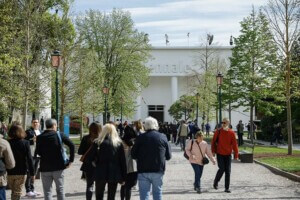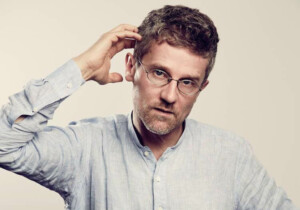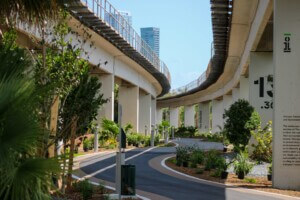Placemaking is tantalizingly open-ended term. Discipline-agnostic, it suggests the creation of destinations where people can gather, meet, and explore. Broadly, modernity in the 20th century established economic and technological conditions that led to sprawling, isolated forms of settlement which made the act of gathering feel burdensome at best, if not altogether alien. Cities, by contrast, have emerged as domains where this activity can flourish. Across the U.S. (and around the world), many people across many professions are working to reestablish locations where we can meet authentically, knowledge can be shared, culture celebrated, and spatial community established. These qualities are what make urban places vibrant and memorable, and case studies of projects that do just this were plentiful during the three days of Utopian Hours 2023, the seventh edition of an international festival of cities which took place over a warm, mid-October weekend in Turin, Italy.
Utopian Hours is the work of Stratosferica, an organization that produces and disseminates urban knowledge. They do this primarily through physical interventions like workshops, installations, and festivals, but also through architectural proposals, video productions, and guided tours. Founded in 2014 by Luca Ballarini and Giacomo Biraghi, the organization has grown to include a team that works the entire spectrum between architecture and events with the goal of creating better urban experiences.
Perhaps the most direct action so far is the outfit’s pandemic-era takeover of the Nuovo Ponte Regina Margherita, a bridge across the Po River in the eastern part of Turin, that became Precollinear Park: With the tramline abandoned, the outfit converted the bridge’s central lanes into a pop-up park complete with seating, planters, lighting, and a bar. Now dismantled, the park’s larger elements, namely two shipping containers, have recently been relocated to the nearby Corso Farini, a street adjacent to University of Turin’s Einaudi campus (designed by Foster + Partners) home to vernacular housing blocks and the abandoned frames of old gasworks. The containers are augmented by new wood furniture, designed and built by students using conservation timber from Gabon, an effort which delivers on Turin’s participation in Cities4Forests, a global alliance of cities which promote the sustainable sourcing timber and protect the world’s forests. During the festival, Corso Farini was activated as a space for meals and conversation.


As in prior years, Utopian Hours 2023 took place at La Centrale Lavazza, an event space adjacent to Lavazza’s headquarters just northeast of the city center. Originally built in 1897 as a power plant, today the space has been reconfigured as a hall for events, though its trussed gantry crane still looms overhead. Across three days, which each began with a panel discussion, a range of presenters, largely from Europe but also with contributors from the U.S. and the Middle East, shared their work and took questions from the audience.

The festival’s strength came in its diversity of speakers: I heard from—and spoke with—city, regional, and federal officials in Italy; placemakers, architects, designers, researchers, developers, podcasters, activists, and directors; among others. (Along the way, someone asked “Is this an architecture festival?” “No, not really,” came the answer.) Encouraging people from siloed realms to interact and make connections is the collisional power of Utopian Hours. Making durable changes to our cities takes coalitions of inspired people working together to get things done. The event made good on its stated manifesto for a new city making.

Yes, architects were on stage—Caroline Bos of UNStudio spoke, as did Giulia Frittoli of BIG and Zuhal Kol of OpenAct Architecture and Design Stage—but others presented their interdisciplinary takes on the work of making space: Juval Dieziger, a “business hippie,” shared his experience at Holzmarkt in Berlin, which has gone from a squatted, open-air club into a set of treehouses to a (proposed) housing project complete with a wood-lined dance venue. Richard Upton, a community-focused entrepreneur, showcased how development can happen in alignment with future-forward social regeneration; Petra Marko reviewed her placemaking efforts in Bratislava, Slovakia, and lessons from her recent book, Meanwhile City; and Eugenia Kargbo, Africa’s first heat officer, joined via Zoom to present her work to make Freetown, Sierra Leone, shaded and therefore cooler. Others offered insights into landscape architecture, student housing, and third spaces—those sticky locales between home and work. Schoonship, a set of modern, wood-clad canal houseboats in Amsterdam set atop boxy, floating concrete hulls, was a particularly successful project: Dutch TV director Marjan de Blok, one of the initiatives’ creators and now a resident, led the crowd through the design, construction, and use, culminating in photos of communal dinners on tables lining the floating walkways.

Efforts in the United States were well-represented. Scott Kratz, of the nonprofit Building Bridges Across the River, shared the 11th Street Bridge Park that will span the Anacostia River in Washington, D.C. Its brief emerged from hundreds of community meetings, and the winning scheme from the competition, designed by OMA and Olin, was selected by the community. (Kratz also tossed out a nice, hard-won definition: “Trust is shared experience over time.”) Patrice Gillespie Smith spoke about the Underline in Miami, which transforms the area beneath an elevated light-rail track into a usable trail. Its first phase, designed by Field Operations, is now open, with two other segments to come. Doug Gordon, one of the three hosts of the podcast The War On Cars, pitched placetaking as a way to take back the city from automobiles. He then asked attendees to imagine the city as if cars never existed, only to pitch them and their drawbacks to see if we’d bite for their use today. To close the festival, Admir Masic, a chemist at MIT, delivered his lab’s research into concrete, which includes solving the mystery of Roman version of the material. He also hinted at experiments to make concrete multifunctional, even capable of storing energy through the use of nanocarbon black, a conductive but inexpensive carbon material, embedded in 3D-printed structures.



Beyond these main-stage talks, Utopian Hours 2023 established space for smaller workshops. Nearby at Dorado, an old, two-story Lavazza warehouse, seven roundtables saw leaders from Verona, the festival’s partner city, in discussion about civic improvements, in addition to other presenters engaging with Turinese students. The outpost—informally outfitted with benches, beanbags, and a bar—was a welcome place to have more direct conversations among an installation of Stratosferica’s prior efforts.



Utopian Hours 2023 also invited engagement with the city of Turin through a walking tour and ample time left for exploration.

In a welcome coincidence, the weekend aligned with the centennial of writer Italo Calvino’s birth, so Sunday afternoon’s proceedings including a reading from Invisible Cities in the original Italian. While most people know this volume of stories, his earlier Marcovaldo is perhaps more relevant for urban dreamers: Organized by season, the collection of short stories finds its main character involved in adventurous misunderstandings, from a plot to fish in a polluted river to the theft of a poisonous rabbit to an attempt to gain a peaceful night of sleep in a park, only to be kept awake by the din of those who service the city overnight. The stories offer comical critiques of postwar industry while leaving room for the imagination. Through its well-produced event, Utopian Hours 2023 fulfills a similar ambition of making space for the inferno of the living. It staged an optimistic program where better futures—already underway—can be transmitted, largely to an audience of young people, with inspiring results.
AN is a media partner for Utopian Hours 2023 and Utopian Hours Miami, which will be held on November 18; tickets are on sale now.











